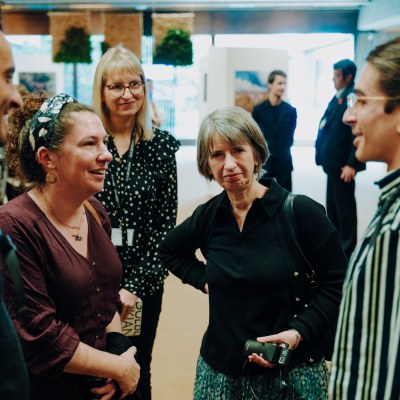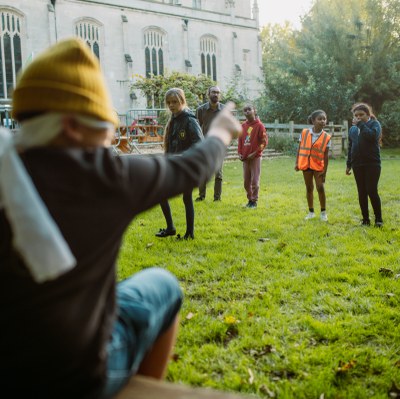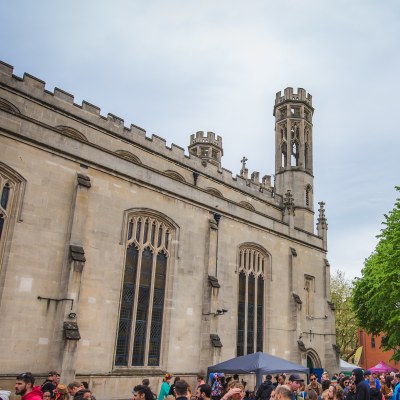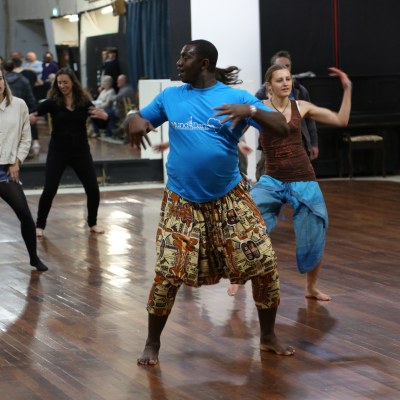Opinion: Bristol Arts Funding
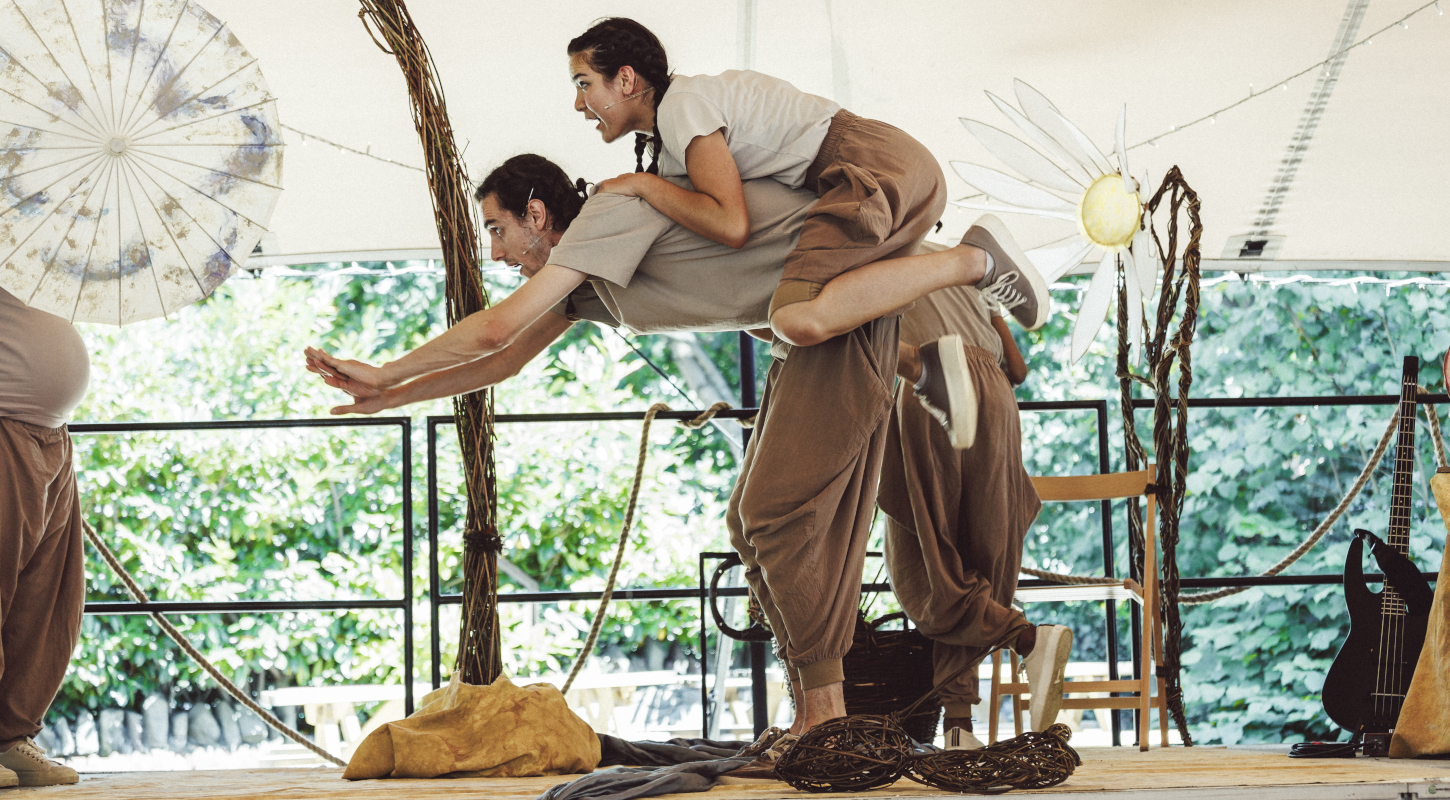
Tide and Tales perform during Summer Stay and Play sessions. Photo credit: Alistair Brookes
Trinity CEO, Emma Harvey, reflects on the challenges facing Bristol arts in the context of the wider cuts to arts funding and the impact this has on limiting pathways into careers in the creative industries.
In December 2023, Bristol City Council (BCC) announced their decisions for the Cultural Investment Programme, awarding grants in principle to 15 organisations. This included Trinity, newly funded Unique Voice, and Travelling Light Theatre Company who recently lost their regular funding from Arts Council England. Also Acta, ASLS, Asian Arts Agency, Bristol Pride, Circomedia, CYN, KWMC, Paraorchestra, Rising Arts Agency, Spike Island, St Paul’s Carnival and the Tobacco Factory.
With nearly a 40% reduction in total funds compared to past rounds, 13 groups missed out on regular investment. This included previously funded groups Bristol Old Vic, Encounters, Exchange, IBT, MAYK, RWA, Saffron, St Georges, Trigger and Watershed, alongside new proposals from APE, SSGB and Wardrobe Theatre.
"Rather than sharpening our elbows to fight for the crumbs that fall from the table we should be Oliver Twisting it up and asking for more."
As testament to the sector’s precariousness, two long-standing arts organisations were listed as, “closed or closing so not considered for investment”. Those not selected have responded with concerns about the continued cost of living crisis reducing audience revenue alongside rising overheads placing pressures on finances. Cultural institutions traditionally seen as too big to fail are facing an uncertain future and all funding is still subject to annual approval. This continued uncertainty means we're all on a sinking ship, just at different points of an inescapable decline.
Successes and setbacks are all part of business as usual at Trinity. After almost 20 years the best I can say when someone asks if we'll be here in twelve months is, "hopefully". In the voluntary sector, survival is as good as it gets. Hearing frequent ‘Nos' then trying to work out what's next is part of the job. Competitive funding rounds linked to political cycles are perhaps the worst at breeding a "them and us" mindset, making organisations old and new, big and small go up against one another for ever decreasing funds. It creates a short-term focus and leads to over-commitment, particularly from those smaller, newer groups desperate to move from being “out” to “in” any funding portfolio round. It leads to an unrealistic emphasis on measuring the intangible that benefits no one and decreases our appetite for risk, stifling the very creativity we’re seeking to support.
Rather than sharpening our elbows to fight for the crumbs that fall from the table we should be Oliver Twisting it up and asking for more. Were BCC to fund all 30 organisations listed to the maximum annual grant amount of £30k per year, this would amount to the amount to less 2% of the city’s total annual revenue spend. With many administrations nationally issuing or on the verge of section 114 notices due to difficulties in delivering balanced budgets, this can make such a case for arts funding appear entitled and out of touch with the everyday suffering of many across the country. But cuts to arts funding are part of a wider narrative (see links, below) of reduced investment in the arts that deprives those without the means from carving out meaningful experiences and careers in the creative industries.
Arts can be an easy thing to cut in difficult times but we’re doing so to the detriment of those who benefit from its power most. There is an intrinsic value that’s accepted and widely evidenced. Art is good for us; our economy, our health, our sense of place and belonging. And yet, one of the wealthiest city's in one of the wealthiest countries globally can’t even resource the creativity that sits at the heart of our local identity.
Collaborating with three local primary schools, Trinity recognises the significance of early engagement with culture in igniting creative aspirations. Children locally and nationally have witnessed reduced access to arts education compounded by challenges stemming from the pandemic and the ongoing burden of cost of living limiting access to out of school activities.
The ongoing decline in arts investment nationwide results in a gradual erosion of our opportunities to engage with the arts, limiting our cultural pathways. As the voices shaping our shared narratives become fewer, the story of our national identity risks being conveyed through an ever narrowing lens. Over time, this reduces the chances for individuals without existing wealth and means to pursue meaningful careers in an industry that contributes billions to the UK's economy annually.
It is commendable that, for the time being at least, BCC have sought to protect what remains of their public subsidy for the sector and focus what resource it can with the aim of sustaining participatory arts provision within neighbourhoods. But if we really want to ensure everyone has the opportunity to access and make art we need to think of better ways to ensure the investment is felt beyond a handful of suspects, however usual or unusual.
Some of the most successful schemes to support arts and diversify the arts sector have come from creative co-option of back-to-work schemes, from Future Jobs Fund and the recent Kickstart Scheme, providing paid entry level roles for <25s, to Thatcher’s Enterprise Allowance, which enabled some of the UK’s most prolific cultural practitioners to carve out their early careers and saw the birth of Brit Art movement.
Some trusts and foundations are catching on and supporting organisations and creatives in new and flexible ways. As far as public subsidy goes, we’re fighting for a seat at a table where chairs are continually being taken out of the game. Who will secure the chair once the music stops? A more impactful path involves collaborative efforts to lay the foundations for fairer resource distribution. Let’s stop playing someone else’s game and tip the table over.
By Emma Harvey, CEO
Further reading:
Bristol City Council defends cultural venue funding cuts (BBC)
Restore Bristol arts funding! (Equity)
The arts are in crisis (Gal Dem)
Government urged to intervene over local arts cuts (Campaign For The Arts)
Funding cuts and weak economy send UK’s visual arts into crisis (The Art Newspaper)
How will art funding cuts in schools affect creativity? (It’s Nice That)
Huge decline of working class people in the arts reflects fall in wider society (Guardian)




